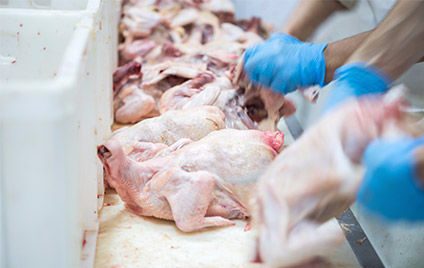
The UK will allow temporary immigration visas for more than ten thousand overseas poultry and haulage workers in a bid to ease a labour crisis and ensure food and fuel supplies.
Hiring of up to 5,500 poultry workers and 5,000 heavy-goods-vehicle drivers will begin in October with visas granted up to Christmas Eve through the so-called Temporary Workers scheme.

Discover B2B Marketing That Performs
Combine business intelligence and editorial excellence to reach engaged professionals across 36 leading media platforms.
Announced by the Government at the weekend, the measures are intended to alleviate an industry-wide labour shortage, with the transport and food sectors hit particularly hard as key workers departed in the wake of Brexit and exacerbated by Covid-19.
There have been warnings for weeks that the current lack of some products on supermarket shelves will get worse in the run-up to Christmas without any easing of visa rules for overseas workers to man meat and poultry processing plants and to fill HGV driver vacancies.
The food industry was last week dealt another blow when US company CF Industries closed two fertiliser plants in the UK, which produce carbon dioxide as a by-product, with the Government having to step-in to secure critical CO2 supplies used in slaughtering and food packaging.
A lack of fuel deliveries to petrol stations and consequent queues and panic-buying have now put added pressure on the Government to act and open the doors to overseas workers. But some industry groups suggest the measures are a drop in the ocean.

US Tariffs are shifting - will you react or anticipate?
Don’t let policy changes catch you off guard. Stay proactive with real-time data and expert analysis.
By GlobalDataThe British Retail Consortium has estimated there is a shortage of 90,000 HGV drivers, a situation made worse by a backlog of people in the UK waiting to take their tests as a result of the pandemic, while the training of haulage drivers remains a lengthy process.
British Chambers of Commerce president Baroness Ruby McGregor-Smith described the new measures as like “throwing a thimble of water on a bonfire”.
She said: “Even if these short-term opportunities attract the maximum amount of people allowed under the scheme, it will not be enough to address the scale of the problem that has now developed in our supply chains. This announcement is the equivalent of throwing a thimble of water on a bonfire.
“Government should be prepared to significantly expand the number of visas issued within this scheme and convene a summit that brings business and government together to find both immediate and longer-term solutions to the many challenges facing firms throughout the UK.
The Government said in a statement announcing the temporary visas rules that the “UK has a highly resilient food supply chain which has coped well in responding to unprecedented challenges. The decision will ensure that farmers and food producers have access to the necessary workforce to mitigate any potential risks to Christmas food supply”.
UK Visas and Immigration is working with the Department for Transport and the Department for Environment, Food and Rural Affairs (Defra) to process the applications.
Richard Griffiths, the CEO of The British Poultry Council, said: “Temporary workers from outside the UK have long been vital to delivering Christmas for our sector and given the unprecedented challenges of the last year they are needed more than ever. British turkey and goose are the centrepiece of Christmas dinners across the country and we are pleased that Government has listened.”
Last week, food industry bodies, including The National Farmers’ Union, The Food and Drink Federation (FDF), The British Meat Processors Association, The British Poultry Council and Dairy UK penned a later to Prime Minister Boris Johnson to urge action on visa rules to address the urgent labour crisis to deliver critical food supplies.
Ian Wright, the CEO of the FDF, told an industry event earlier in September held by the Institute for Government, an independent think tank in London, that the entire food supply chain is lacking about 500,000 of the four million workers usually engaged in the sector.
Responding to the weekend announcement, Wright said: “We welcome the Government’s pragmatic decision to temporarily add HGV drivers and poultry workers to the existing visa scheme.
“This is something UK food and drink manufacturers have asked for over the last few months to alleviate some of the pressure labour shortages have placed on the food supply chain.
“This is a start but we need the Government to continue to collaborate with industry and seek additional long-term solutions.”
The Government appears to have heeded the warnings, with Environment Secretary George Eustice saying at the weekend: “We have listened to concerns from the sector and we are acting to alleviate what is a very tight labour market.”
UK labour union Unite suggested the temporary visa rules for food workers are like kicking a can down the road, with longer-term issues needing to be addressed in areas such as wages and working conditions.
It described the Government’s measures as “propping up a broken and exploitative system”.
Bev Clarkson, Unite’s national officer for food, drink and agriculture, said: “The poverty pay and insecure contracts on offer in poultry processing do not compensate for the physically draining and unpleasant work. That needs to change. What must not happen is the re-establishment of an employment system that relies on exploited migrant labour and pits workers against each other.”
Clarkson proposed that exploitation of foreign workers needs to be avoided.
“Three months is an incredibly short amount of time for a visa scheme to operate in. There is a danger it could be used to exploit vulnerable migrant workers.
“The visa process must ensure that staff are properly paid, housed and given access to welfare and healthcare facilities and to trade union representation. Unite is on the ground at the UK’s poultry plants and our reps and activists will be monitoring the situation closely.”





